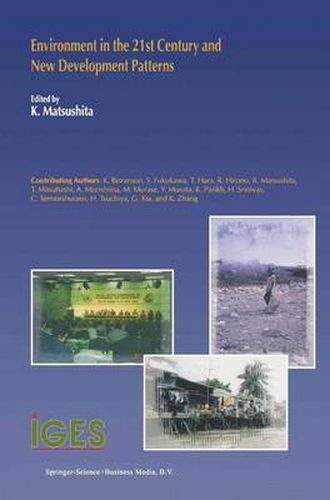Readings Newsletter
Become a Readings Member to make your shopping experience even easier.
Sign in or sign up for free!
You’re not far away from qualifying for FREE standard shipping within Australia
You’ve qualified for FREE standard shipping within Australia
The cart is loading…






This title is printed to order. This book may have been self-published. If so, we cannot guarantee the quality of the content. In the main most books will have gone through the editing process however some may not. We therefore suggest that you be aware of this before ordering this book. If in doubt check either the author or publisher’s details as we are unable to accept any returns unless they are faulty. Please contact us if you have any questions.
Economic growth after World War II was made possible through dramatic increases in the use of material resources and energy. It is apparent that current development patterns followed by industrialized countries are causing serious environmental problems and that they are neither ecologically nor socially sustainable.
In recent years, many Asian developing countries, which have suffered from poverty for decades, are experiencing high rates of economic growth by introducing material-intensive production and consumption patterns. The globalization trends magnify on a global scale the problems associated with current development patterns.
How can we transform existing economic and social systems into more environmentally benign and sustainable ones? This book presents a number of issues that must be considered whn discussing new development patterns, which are environmentally friendly and socially fair. It covers concepts of new development patterns, new energy and water supply, sustainable agriculture, information technology and environment, information disclosure and poverty alleviation.
Audience: This volume will be of interest to those who are involved in innovative interdisciplinary policy studies on environment and development, particularly in Asia and the Pacific region. Also those who are interested in realizing sustainable development through agriculture, water supply, information technology, chemical industry and sustainability issues in China and India.
$9.00 standard shipping within Australia
FREE standard shipping within Australia for orders over $100.00
Express & International shipping calculated at checkout
This title is printed to order. This book may have been self-published. If so, we cannot guarantee the quality of the content. In the main most books will have gone through the editing process however some may not. We therefore suggest that you be aware of this before ordering this book. If in doubt check either the author or publisher’s details as we are unable to accept any returns unless they are faulty. Please contact us if you have any questions.
Economic growth after World War II was made possible through dramatic increases in the use of material resources and energy. It is apparent that current development patterns followed by industrialized countries are causing serious environmental problems and that they are neither ecologically nor socially sustainable.
In recent years, many Asian developing countries, which have suffered from poverty for decades, are experiencing high rates of economic growth by introducing material-intensive production and consumption patterns. The globalization trends magnify on a global scale the problems associated with current development patterns.
How can we transform existing economic and social systems into more environmentally benign and sustainable ones? This book presents a number of issues that must be considered whn discussing new development patterns, which are environmentally friendly and socially fair. It covers concepts of new development patterns, new energy and water supply, sustainable agriculture, information technology and environment, information disclosure and poverty alleviation.
Audience: This volume will be of interest to those who are involved in innovative interdisciplinary policy studies on environment and development, particularly in Asia and the Pacific region. Also those who are interested in realizing sustainable development through agriculture, water supply, information technology, chemical industry and sustainability issues in China and India.